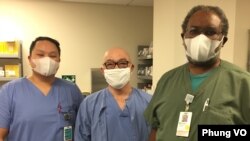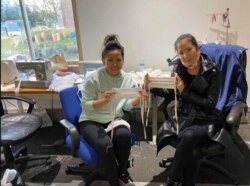Vietnamese women in and around Seattle are sewing face masks for health care workers who face a shortage of protective equipment in Washington state, where the first U.S. case of COVID-19 was confirmed in January.
Katie Nguyen, a tailor in Spanaway, Washington, who specialized in custom island attire, decided to start sewing masks when state authorities ordered nonessential businesses to close as part of the lockdown effort to contain the coronavirus. With a handful of volunteers, Nguyen has made 10,000 masks.
Phung Vo, who works in the inpatient pharmacy at EvergreenHealth Medical Center in Kirkland, Washington, received about 200 masks directly from one of the volunteers, Loan Ngo, just days ago. He estimates he and his colleagues use about 20 masks a day.
“I showed the masks to my supervisor who said ‘Perfect,’” Vo told VOA Vietnamese. He added he and his colleagues at the pharmacy are required to wear masks and are “so grateful for the cloth mask donation. Our Evergreen hospital is the most crowded with COVID-19 patients in the state."
“I’m very grateful that the community makes the masks and donates them,” Vo said. “We wear them, we use them...[They’re] very good quality fabric.’’
Washington has been hard hit by the coronavirus. The first COVID-19 case in the United States was confirmed there January 21. The patient had recently returned from Wuhan, the Chinese city where the coronavirus emerged late last year. The first COVID-19 fatality in the U.S. occurred in Kirkland, a city outside Seattle, and a day later, Gov. Jay Inslee declared a state of emergency.
As of April 14, the Washington State Department of Health reports 10,783 confirmed cases of COVID-19 and 567 deaths.
As the virus spread at a speed that would soon become familiar elsewhere in the United States, Nguyen, who’s from Da Lat in Vietnam, and her friends trimmed and cut rectangles of cotton fabric and sewed them into face masks.
“We have answered pleas from hospitals, doctors and nurses who are so desperate for personal protective equipment amid the coronavirus pandemic,” Nguyen told VOA Vietnamese.
She turned the workshop in her home into a mask-making center that adhered to social distancing guidelines. Members of the Vietnamese community dropped off supplies, and friends in Vietnam sent fabric. Volunteers who did not know how to sew “came here to learn and later they did it on their own at home,” Nguyen said.
Late in March, Nguyen dispersed the group at her house to adhere to Washington state’s stay-at-home order. The volunteers continued to sew in their own homes.
Loan Ngo and An Lam, both Seattle residents, live together and continued to sew together. In Tacoma, Bellevue, Federal Way and Renton, Washington, the machines whirred and hummed as the Vietnamese women, and some sewing men, made masks.
Ngo had driven more than 70 miles each way every day from Seattle to Nguyen’s house in Spanaway before settling down to sew in Seattle.
“We’re still heathy, we need to do something,” said Ngo, who is from Ho Chi Minh City. “A mask is still better than nothing, right? And our doctors, nurses and health care workers are on the front lines of the battle.”
“I delivered masks to Valley Medical Center in Renton this morning,” Ngo said. “Sitting in my car with masks on my hands, I cried when I saw medical workers and … ambulances rushing on the compound. They are most vulnerable to virus infection.”
Two weeks ago, Lam set up a Facebook page so Vietnamese women could share information about where to obtain mask fabric suitable for hospital workers. Now Vietnamese volunteers in California, Texas, Oregon and Georgia are making masks.
“My neighbor and I have made over 200 masks so far,” said Lam, who came to the U.S. from the Mekong Delta. She has her post-production routine worked out: the masks are washed, ironed, stashed in plastic bags and then delivered to area medical centers.
“I feel happier to know that health care workers wear my masks,” Lam told VOA while running her sewing machine.
Nguyen said that she and her group have made and donated more than 10,000 face masks.
Nguyen said as long as the supplies keep coming, the group will keep sewing.
“We may stop when hospitals in the region receive enough masks from [the] federal government’s medical supplies,” she said.
“I received more than 100 messages a day asking for masks,” said Nguyen, who gives the masks only to hospitals, clinics and nursing homes.
“I feel heartbroken to know that some health workers wear a paper mask three days in a row.”

